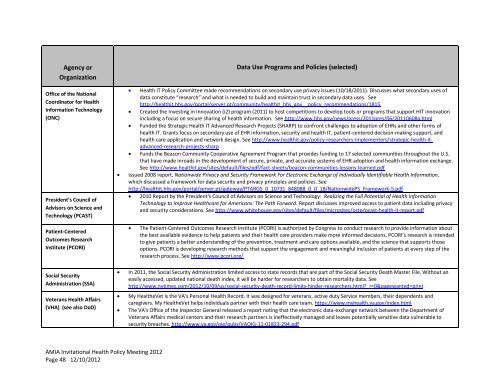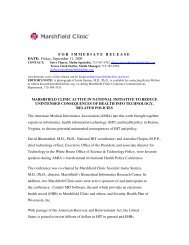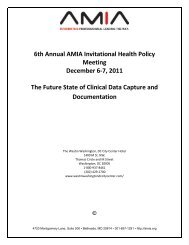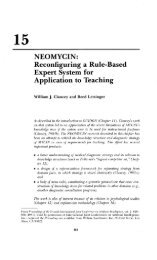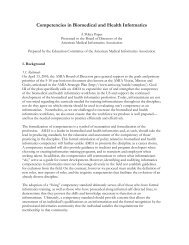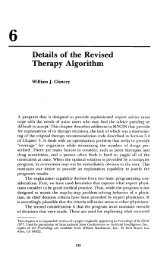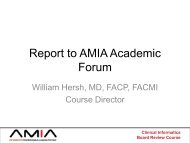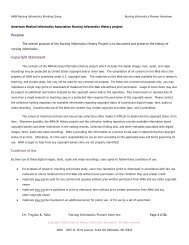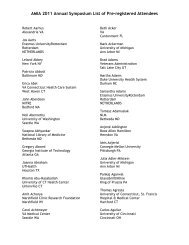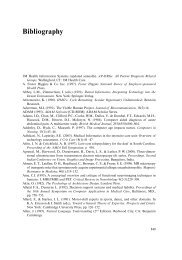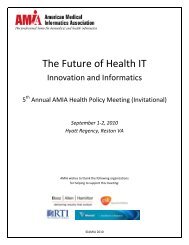7th Annual AMIA Invitational Health Policy Meeting December 12-13 ...
7th Annual AMIA Invitational Health Policy Meeting December 12-13 ...
7th Annual AMIA Invitational Health Policy Meeting December 12-13 ...
You also want an ePaper? Increase the reach of your titles
YUMPU automatically turns print PDFs into web optimized ePapers that Google loves.
Agency or<br />
Organization<br />
Office of the National<br />
Coordinator for <strong>Health</strong><br />
Information Technology<br />
(ONC)<br />
President’s Council of<br />
Advisors on Science and<br />
Technology (PCAST)<br />
Patient-Centered<br />
Outcomes Research<br />
Institute (PCORI)<br />
Social Security<br />
Administration (SSA)<br />
Veterans <strong>Health</strong> Affairs<br />
(VHA) (see also DoD)<br />
<strong>AMIA</strong> <strong>Invitational</strong> <strong>Health</strong> <strong>Policy</strong> <strong>Meeting</strong> 20<strong>12</strong><br />
Page 48 <strong>12</strong>/10/20<strong>12</strong><br />
Data Use Programs and Policies (selected)<br />
� <strong>Health</strong> IT <strong>Policy</strong> Committee made recommendations on secondary use privacy issues (10/18/2011). Discusses what secondary uses of<br />
data constitute “research” and what is needed to build and maintain trust in secondary data uses. See<br />
http://healthit.hhs.gov/portal/server.pt/community/healthit_hhs_gov__policy_recommendations/1815<br />
� Created the Investing in Innovation (i2) program (2011) to host competitions to develop tools or programs that support HIT innovation<br />
including a focus on secure sharing of health information. See http://www.hhs.gov/news/press/2011pres/06/20110608a.html<br />
� Funded the Strategic <strong>Health</strong> IT Advanced Research Projects (SHARP) to confront challenges to adoption of EHRs and other forms of<br />
health IT. Grants focus on secondary use of EHR information, security and health IT, patient-centered decision-making support, and<br />
health care application and network design. See http://www.healthit.gov/policy-researchers-implementers/strategic-health-itadvanced-research-projects-sharp<br />
� Funds the Beacon Community Cooperative Agreement Program that provides funding to 17 selected communities throughout the U.S.<br />
that have made inroads in the development of secure, private, and accurate systems of EHR adoption and health information exchange.<br />
See http://www.healthit.gov/sites/default/files/pdf/fact-sheets/beacon-communities-lessons-learned.pdf<br />
� Issued 2008 report, Nationwide Privacy and Security Framework For Electronic Exchange of Individually Identifiable <strong>Health</strong> Information,<br />
which discussed a framework for data security and privacy principles and policies. See<br />
http://healthit.hhs.gov/portal/server.pt/gateway/PTARGS_0_10731_848088_0_0_18/NationwidePS_Framework-5.pdf<br />
� 2010 Report by the President's Council of Advisors on Science and Technology: Realizing the Full Potential of <strong>Health</strong> Information<br />
Technology to Improve <strong>Health</strong>care for Americans: The Path Forward. Report discusses improved access to patient data including privacy<br />
and security considerations. See http://www.whitehouse.gov/sites/default/files/microsites/ostp/pcast-health-it-report.pdf<br />
� The Patient-Centered Outcomes Research Institute (PCORI) is authorized by Congress to conduct research to provide information about<br />
the best available evidence to help patients and their health care providers make more informed decisions. PCORI’s research is intended<br />
to give patients a better understanding of the prevention, treatment and care options available, and the science that supports those<br />
options. PCORI is developing research methods that support the engagement and meaningful inclusion of patients at every step of the<br />
research process. See http://www.pcori.org/<br />
� In 2011, the Social Security Administration limited access to state records that are part of the Social Security Death Master File. Without an<br />
easily accessed, updated national death index, it will be harder for researchers to obtain mortality data. See<br />
http://www.nytimes.com/20<strong>12</strong>/10/09/us/social-security-death-record-limits-hinder-researchers.html?_r=0&pagewanted=print<br />
� My <strong>Health</strong>eVet is the VA's Personal <strong>Health</strong> Record. It was designed for veterans, active duty Service members, their dependents and<br />
caregivers. My <strong>Health</strong>eVet helps individuals partner with their health care team. https://www.myhealth.va.gov/index.html<br />
� The VA's Office of the Inspector General released a report noting that the electronic data-exchange network between the Department of<br />
Veterans Affairs medical centers and their research partners is ineffectively managed and leaves potentially sensitive data vulnerable to<br />
security breaches. http://www.va.gov/oig/pubs/VAOIG-11-01823-294.pdf


